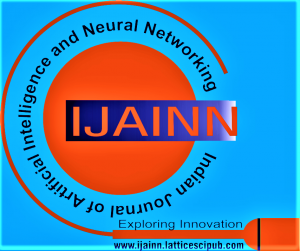![]()
Time-Efficient Algorithm for Data Annotation using Deep Learning
Sumit Chaudhary1, Neha Singh2, Salaiya Pankaj3
1Dr. Sumit Chaudhary, Associate Professor & HOD, Department of Computer Science and Engineering, Indrashil University (Cadila Group), Kadi (Gujarat), India.
2Ms. Neha Singh, Assistant Professor, Department of Computer Science and Engineering, Indrashil University (Cadila Group), Kadi (Gujarat), India.
3Salaiya Pankaj, Department of Computer Science and Engineering, Indrashil University (Cadila Group), Kadi (Gujarat), India.
Manuscript received on 30 July 2022 | Revised Manuscript received on 13 August 2022 | Manuscript Accepted on 15 August 2022 | Manuscript published on 30 August 2022 | PP: 8-11 | Volume-2 Issue-5, August 2022 | Retrieval Number: 100.1/ijainn.E1058082522 | DOI: 10.54105/ijainn.E1058.082522
Open Access | Ethics and Policies | Cite | Mendeley | Indexing and Abstracting
© The Authors. Published by Lattice Science Publication (LSP). This is an open access article under the CC-BY-NC-ND license (http://creativecommons.org/licenses/by-nc-nd/4.0/)
Abstract: Current generation emphasis on the Digital world which creates a lot of unbeneficial data. The paper is about data annotation using deep learning as there is a lot of data available online but which data is useful can be labeled using these techniques. The unstructured data is labeled by many techniques but implementation of deep learning for labeling the unstructured data results in saving the time with high efficiency. In this paper introduce a method for data annotation, for that we can use unlabeled data as input and it is classified using the K-Nearest Neighbor algorithm. K-Nearest Neighbor is the fastest and its accuracy is very high compared to other classification algorithms. After classified the unlabeled data we use it as input and annotate data using deep learning techniques. In deep learning we use an auto annotator for annotating data. After annotating data, check the accuracy of annotated data and time efficiency of data annotation. In case the accuracy is low then we can retrain the data and make it more accurate.
Keywords: K-Nearest, Neighbor Algorithm, Deep Learning
Scope of the Article: Deep Learning
